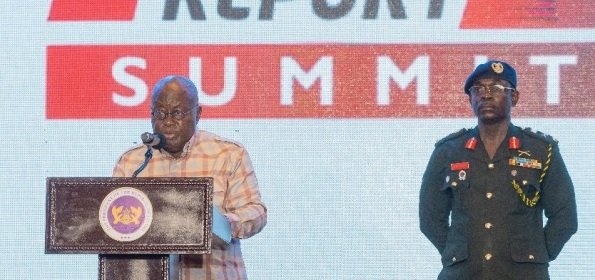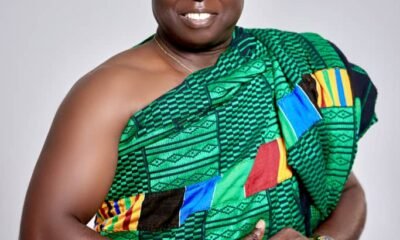News
‘Agyapadie’ is a fabricated document by my political opponents – Akufo-Addo

In a compelling address today at the Ghana Report Summit, President Nana Addo Dankwa Akufo-Addo shed light on the fabricated narratives that have been used to undermine his political career, focusing on the “Agyapadie” document, which first surfaced in the run-up to the 2020 elecrions.
The Summit, themed “Dealing with Misinformation and Disinformation – Election 2024,” highlighted the dangers of false information in the democratic process.
The Agyapadie document alleges a grand scheme by the New Patriotic Party (NPP) to annex state assets. According to President Akufo-Addo, this fabricated document has been circulated by opposition operatives as evidence of the NPP’s supposed plans.
“This baseless accusation is yet another example of the malicious tactics used to undermine my credibility and integrity,” the President stated.
President Akufo-Addo’s political career has been fraught with similar false accusations, dating back to the 2008 presidential election. During that campaign, baseless allegations of drug trafficking were spread to tarnish his image. Rumors about his health were also circulated to cast doubt on his ability to serve as President. Opponents accused then-President John Kufuor of selling all of Ghana’s gold reserves, a claim that was patently false.
The 2012 election cycle saw a continuation of these tactics, with false reports of Akufo-Addo’s alleged arrest in London for drug possession making headlines. Fabricated quotes designed to stir ethnic tensions were also disseminated, aiming to divide the electorate. In 2016, opponents stooped to a new low, alleging that Akufo-Addo had killed his late wife, a claim that was not only false but deeply offensive.
“As the 2024 General Elections approach, the Agyapadie document is the latest in a series of lies aimed at discrediting President Akufo-Addo and his party. This fictitious narrative, like the ones before it, highlights the importance of discerning truth from falsehood and remaining vigilant against the dangers of misinformation and disinformation,” he said.
President Akufo-Addo emphasized that combating misinformation and disinformation requires a multi-faceted approach. Strengthening regulatory frameworks to hold individuals and organizations accountable for spreading false information is crucial.
He added that collaborations with technology companies are essential to develop mechanisms for monitoring and curbing the spread of false information on digital platforms.Public awareness campaigns are also vital.
“Educating citizens about the dangers of misinformation and disinformation and promoting media literacy can empower voters to make informed decisions. Supporting fact-checking organizations to verify information and debunk false claims is another important strategy,” he said.
In his address, President Akufo-Addo stressed the need for all political actors to commit to truthfulness and transparency in their campaign,” The spread of false information for political gain undermines the democratic process and erodes public trust. Political parties and candidates must engage in constructive dialogue, presenting their ideas and policies to the electorate in a truthful and respectful manner.”
According to him, the Civil society organizations play an invaluable role in promoting transparency, accountability, and media literacy.
He added that their advocacy efforts are essential in curbing misinformation and disinformation. The public also has a crucial role to play by verifying information before sharing it and relying on reputable news sources.
“The Agyapadie scandal serves as a stark reminder of the lengths to which some will go to undermine political opponents. As Ghana prepares for the 2024 General Elections, it is imperative to address these challenges head-on. By working together – government, media, civil society, and the public – Ghana can create an environment where truth prevails, and its democracy thrives,” he concluded.
News
Damango wages war on shisha smoking among minors

Troubled and anxious citizens in Damongo of the Savannah Region have expressed concerns about the number of young people, believed to be under the age of 18, involved in ‘shisha’ smoking in pubs and drinking spots within the township.
Eyewitnesses say the minors were seen patronising nightlife venues, where Shisha smoking happen in the open.
The situation has sparked renewed public concern over the enforcement of child protection laws and regulations governing the operations of entertainment centres in the municipality and country as a whole.
An eyewitness, who spoke to The Spectator on conditions of anonymity for security reasons, noted that the situation was becoming increasingly common.
“This is not a one-off incident. It is becoming very common, but residents like us cannot openly report or speak about it because our lives will be at risk,” he said.
Under Ghanaian law, minors were prohibited from patronising Shisha.
Public health experts have consistently warned that shisha use exposes users to harmful substances that can negatively affect brain development, respiratory health, and overall well-being, particularly among young people.
The residents believe the alleged incidents point to broader challenges relating to youth supervision, substance abuse, and weak enforcement of existing regulations and have called on municipal authorities, security agencies, and regulatory bodies to intensify monitoring of pubs and entertainment centres to ensure compliance with the law.
In an effort to address the menace, Mr Salisu Be-Awurbi, the Savannah Regional Minister, has led public education campaigns, engaged security agencies, and supported enforcement actions to address the rising use of illicit substances in the region.
Wura Kelly Seidu Boresah I, the Chief of Damongo, has also called on all stakeholders including parents, community leaders, institutions, and young people to actively support efforts to curb drug abuse, warning that the rising consumption of hard drugs poses a serious health threat to the future of the youth in the Savannah Region.
He also cautioned individuals involved in the sale and distribution of illicit drugs to immediately desist from the practice, stressing that offenders will face arrest and prosecution in accordance with the law.
From Geoffrey Buta, Damongo, Savannah Region
Join our WhatsApp Channel now!
https://whatsapp.com/channel/0029VbBElzjInlqHhl1aTU27
News
Ga Mantse endorses initiative to end domestic voilence

Dr Theresa Baffour, an advocate for ending violence and Chief Executive Officer (CEO) of SAHM SAHW Foundation, has said that society plays a critical and pivotal role in breaking the cycle of domestic violence.
According to her, domestic violence is a major contributor of making women, who are mostly the victims, mentally derailed and unable to engage in economic activities.
She said this when the foundation called on the Ga Mantse, Nii Tackie Teiko Tsuru II, to solicit support for the initiative by the “Strong and Healthy Minds, Strong and Healthy Women” (SAHM SAHW) to combat domestic violence within the Ga State.
The visit was occasioned by the fact that domestic violence cases have become quite prevalent in the Ga communities and is retarding growth.
According to her, the canker was an impediment to national development because the victims were usually tortured and would have to go through series of therapies to return to the right state of mind.
Dr Baffour mentioned that Gender-Based Violence (GBV) places a mental toll on women, and was, therefore, important to break the cycle through comprehensive mental health support, crisis intervention and empowerment programmes in communities with high rates of GBV.
This intervention, she underscored, would help in empowering the denigrated victim of domestic violence to soundly heal, build and thrive.
Dr Baffour added that the initiative would provide holistic, trauma-informed mental health care and advocacy for young women affected by domestic violence.
According to her, the above statement would create safe spaces for healing and equipping them with entrepreneurial skills for renewed hope and empowered life.
The Ga Mantse pledged his support for the laudable initiative to combat domestic violence and also acknowledged the need to address it in the Ga State.
Further endorsement came from Justice Julia Naa-Yarley Adjei Amoah, Chief of Staff at the Office of the Ga Mantse, as she commended the team of SAHM SAHW Foundation for taking a bold step to end the canker in the Greater Accra.
She added that it was a step in the right direction to save vulnerable women from torture, stress and emotional abuse.
By Alfred Nii Arday Ankrah














